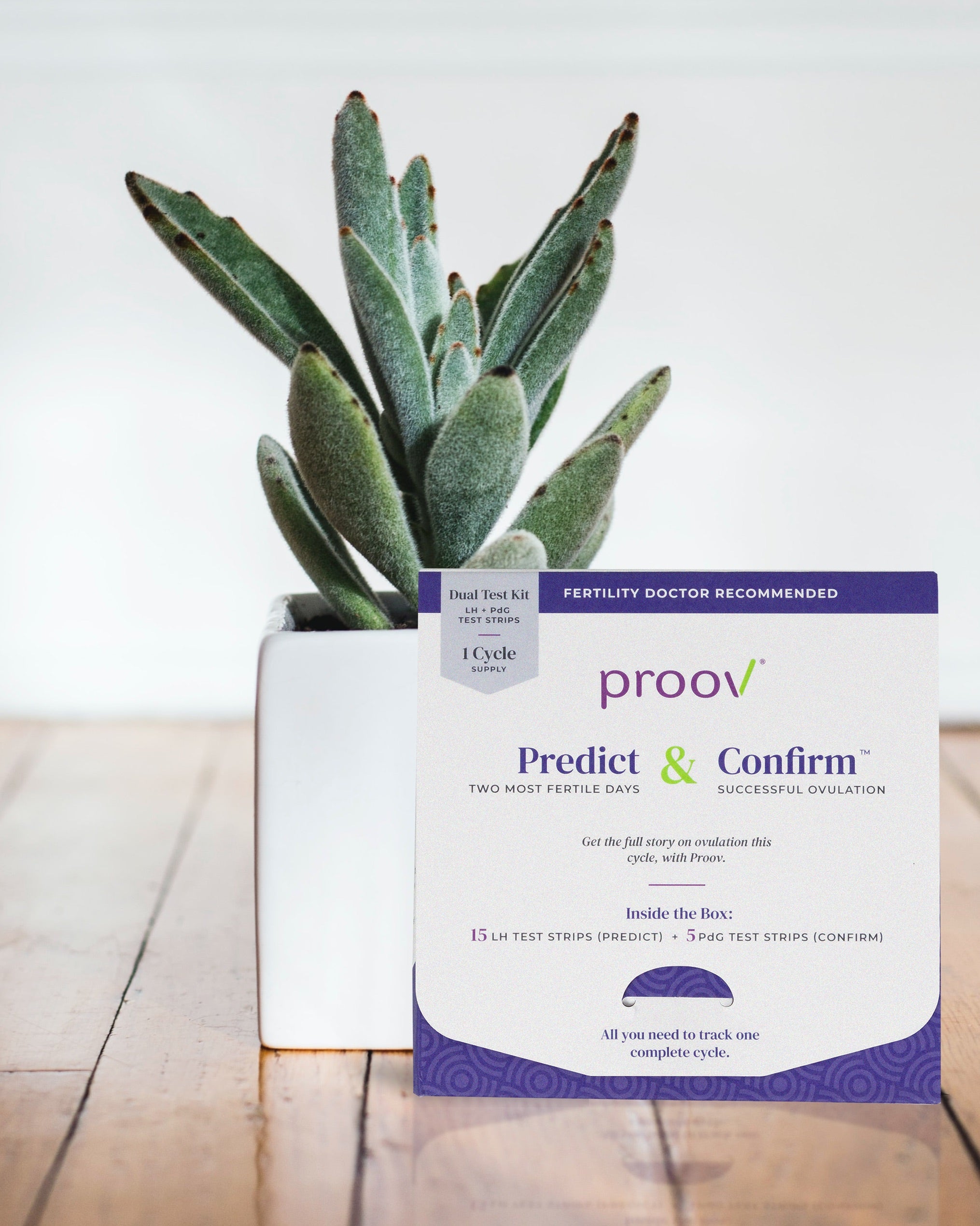Written by: Dr. Amy Beckley, PhD, Founder and Inventor of the Proov test — the first and only FDA-cleared test to confirm successful ovulation at home.
Written on 11/24/20

Let’s talk progesterone!
Here at Proov, progesterone is our favorite hormone! Think of it as a piece of the fertility puzzle which when missing may not only prevent pregnancy from happening, but can also cause recurrent miscarriages even if fertilization and implantation were to occur.
Progesterone is arguably the most important hormone in the female body, with an essential role in your cycle and pregnancy. By definition, progesterone is the “pregnancy hormone” and is necessary to get and stay pregnant. Without enough of this critical hormone, it can be more difficult to get pregnant.
While estrogen surges in the follicular phase (first half of your cycle), progesterone rises after ovulation. Ovulation occurs when a mature egg is released from by a follicle and makes its way through the fallopian tube where it will hopefully meet sperm. The empty follicle, also called the corpus luteum, then produces progesterone in order to stabilize the uterine lining and make it “sticky” for an embryo.
Progesterone peaks approximately 7 days past your peak fertility day. If there is no fertilized egg to implant, progesterone levels drop and Aunt Flo arrives. If there is a fertilized egg but the corpus luteum doesn’t produce enough progesterone, the uterine lining may not support the embryo and implantation may fail to occur properly.

Testing for Progesterone
Low progesterone levels and problems with ovulation are responsible for up to 25% of cases of infertility. Understanding if you have adequate levels can be easy to determine if you know what to look for. Low progesterone can cause symptoms like dizziness, bloating to sensitive breasts, nausea, cramping and extreme fatigue. But not to worry! Testing is simple and can provide important information about your overall ovulation health.
Progesterone tests can be performed in a doctors office, but the results may not give you the full picture. Serum blood draws only give you a snapshot of your progesterone levels at one point in time. Because progesterone can fluctuate up to 8 times in just 90 minutes and range anywhere from 2.3 to 40.1 ng/mL during a 24-hour period, one single blood result can easily give you an inaccurate assumption about your levels. The solution would be to have your blood drawn 2-3 days in a row, but who wants to be poked multiple days in a row? Not us!

PdG (pregnanediol glucuronide) is a progesterone metabolite found in urine. Proov measures PdG to understand your progesterone levels.
Confirm successful ovulation with Proov
What does successful ovulation have to do with progesterone? Quite a bit! When an ovulation is “successful” — in other words it was an ovulation that provided the best chance at successfully conceiving — progesterone levels are elevated for multiple days during the luteal phase.
Proov is a simple way to confirm successful ovulation at home. Proov works by measuring PdG, a progesterone metabolite, found in urine. Using first morning urine allows the test to determine an average window where progesterone levels have stabilized over 6+ hours. And because Proov is non-invasive, it allows for testing on subsequent days to ensure PdG levels after ovulation are elevated high enough for long enough.
With an accuracy of 99% in detecting PdG in urine, Proov is the easiest and most convenient way for you to confirm successful ovulation so you can have the best chance at conceiving. Proov empowers you with valuable information so that you can have a better conversation with your doctor on next steps.
When in my cycle do I test PdG?
First and foremost you need to test your LH surge to determine your peak fertility day. Proov’s Predict & Confirm kit comes with 15 LH strips and 5 PdG strips so you can get the full ovulation picture. Testing LH levels twice a day can give you a more accurate reading on when you are about to ovulate. Using the Proov PdG strips on days 7, 8, 9, and 10 after you’ve determined peak fertility can help you understand if you’ve ovulated successfully and if that ovulation was successful!
Since PdG levels can drop after peak fertility, we advise testing through day 10 past peak so you can make sure levels stay elevated! Proov allows you to test in the comfort of your home without the needles. Its 99% accuracy rate and FDA clearance provides peace of mind for Proovers wanting to get the full ovulation picture!

What does PdG tell me?
PdG (pregnanediol glucuronide) is a metabolite of progesterone and is secreted into urine. Measuring PdG offers an average measure of your progesterone levels after ovulation. When measured on days 7, 8, 9, and 10 past peak, PdG levels provide a better picture of your ovulation health compared to a one-time serum level blood draw that only shows levels at a specific point in time.
How can I improve PdG levels?
If you’ve had four positive Proov tests on days 7, 8, 9, and 10, congratulations! You’ve had a successful ovulation and are one step closer to solving your pregnancy puzzle. But if your Proov results are negative on any of those days there are a few things you can do to increase your levels, including dieting and avoid over exercising. We’ve written a great blog on how to naturally increase your levels!
Understanding the importance of progesterone and PdG testing is essential when TTC and even cycle tracking. Your PdG levels can give you valuable information that can put you one step closer to achieving your fertility goals. The better you know your body, the more empowered you are to make the best decisions for yourself!













